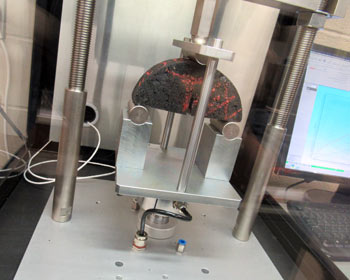

MPC |
| Title: | Characterization of the Plant-Based Bio-Asphalt Binder and Bio-Additives |
| Principal Investigators: | Rouzbeh Ghabchi |
| University: | South Dakota State University |
| Status: | Completed |
| Year: | 2018 |
| Grant #: | 69A3551747108 (FAST Act) |
| Project #: | MPC-575 |
| RiP #: | 01677410 |
| RH Display ID: | 15398 |
| Keywords: | additives, asphalt pavements, binder content, bituminous binders, evaluation and assessment, feasibility analysis, laboratory tests, vegetable materials, waste products |
 It is estimated that more than 27 million tons of asphalt binder with a value of over 12 billion dollars are annually used in the construction of U.S. highways. Asphalt binder used for pavement construction is obtained mainly by the distillation of crude oil in refineries. The scarcity of natural resources, environmental concerns, and emerging needs for sustainable materials have spurred development and use of materials and processes that are renewable and environmentally friendly. In response to this need, initiatives have been taken to develop a new generation of bio-based construction materials, as a result of continuous innovation in the use of agricultural products, byproducts and biomass as a material feedstock. Development of plant-based bio-asphalt binder to replace the petroleum-based binder is a major element of these initiatives. Therefore, development and evaluation of innovative plant-based asphalt binders and additives, such as cellulose and lignin will help to increase use of bio-materials to maximize the sustainability of ground transportation system. The proposed study aims at evaluating bio-asphalt binders and additives derived from agricultural products and byproducts prevailing in North Central Region (e.g., corn and soybean) as the primary feedstock. This will be achieved through a laboratory testing program to evaluate the performance of asphalt mixes containing plant-based bio-asphalt binder and cellulose Nano-fibers. The results of this research will allow the research team collect the necessary data to assess the feasibility of using these materials in construction of asphalt pavements in South Dakota and elsewhere.
It is estimated that more than 27 million tons of asphalt binder with a value of over 12 billion dollars are annually used in the construction of U.S. highways. Asphalt binder used for pavement construction is obtained mainly by the distillation of crude oil in refineries. The scarcity of natural resources, environmental concerns, and emerging needs for sustainable materials have spurred development and use of materials and processes that are renewable and environmentally friendly. In response to this need, initiatives have been taken to develop a new generation of bio-based construction materials, as a result of continuous innovation in the use of agricultural products, byproducts and biomass as a material feedstock. Development of plant-based bio-asphalt binder to replace the petroleum-based binder is a major element of these initiatives. Therefore, development and evaluation of innovative plant-based asphalt binders and additives, such as cellulose and lignin will help to increase use of bio-materials to maximize the sustainability of ground transportation system. The proposed study aims at evaluating bio-asphalt binders and additives derived from agricultural products and byproducts prevailing in North Central Region (e.g., corn and soybean) as the primary feedstock. This will be achieved through a laboratory testing program to evaluate the performance of asphalt mixes containing plant-based bio-asphalt binder and cellulose Nano-fibers. The results of this research will allow the research team collect the necessary data to assess the feasibility of using these materials in construction of asphalt pavements in South Dakota and elsewhere.
Note to project PIs: please use the Track Changes feature when editing the above Word file(s). Updated document(s) should be emailed to ndsu.ugpti@ndsu.edu.